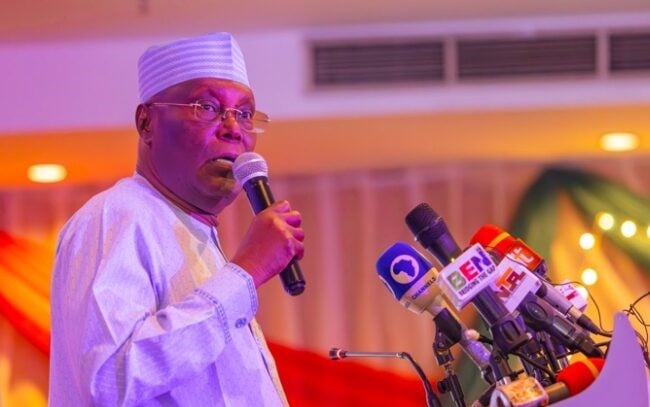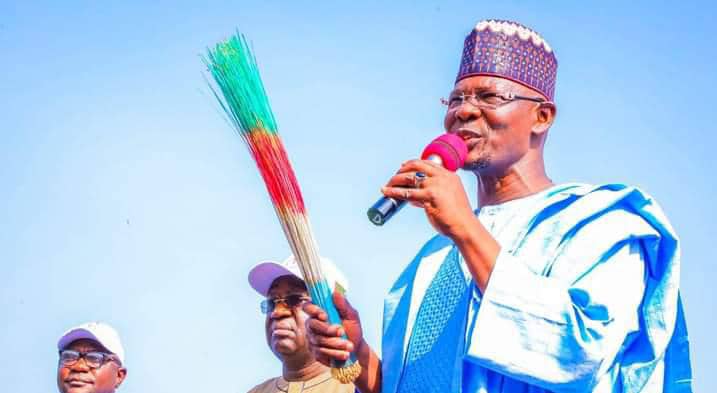Betta Edu, suspended minister of humanitarian affairs and poverty alleviation, received N3 billion of COVID-19 funds for the verification of the national social register.
In a letter dated September 18, 2023 with reference number SH/145/A/220, Femi Gbajabiamila, chief of staff of President Bola Tinubu, told Edu that her request to obtain N3 billion from the COVID-19 funds had been approved by the president.
“Please be informed that Mr. President has approved the expenditure of N3,000,000,000.00 (three billion naira) only, from the Covid-19 Palliative Fund for verification of the National Social Register,” Gbajabiamila wrote.
“Please accept the assurance of my highest regards.”
Advertisement
The N3 billion was disbursed to nine companies, including one linked to Olubunmi Tunji-Ojo, minister of interior. The minister said he resigned from the company in 2019.
Edu’s approval came about two months after the National Economic Council (NEC), presided by Vice-President Kashim Shettima, dropped the social register compiled under Muhammadu Buhari, immediate past president, for lacking credibility.
‘DUMPING’ THE SOCIAL REGISTER
Advertisement
During the meeting of July 20, NEC resolved that the implementation of the cash transfer programme for states should be based on their social registers and a cash reward policy for public servants, for six months.
Speaking with journalists after the meeting, Chukwuma Soludo, governor of Anambra, said NEC agreed that states should come up with their own registers using formal and informal means.
But there was some pushback from citizens and the National Social Safety Nets Coordinating Office (NASSCO).
There were arguments that so much money had already been sunk into getting the data in NASSCO’s custody, and that it would be wasteful to “dump” it.
Advertisement
The coordinating office clarified that the country’s social register is an aggregation of state registers.
“The national social register is an aggregation of state registers built by each of the 36 states and the FCT,” NASSCO posted on X on July 21 following NEC’s decision.
“States build the register using a community-based targeting approach undertaken by targeting teams and enumerators engaged by states and overseen by their ministries of planning.
“NASSCO and the NBS Nigeria work collaboratively on a number of fronts around poverty, most notably on the national living standards survey (NLSS).”
Advertisement
Here were some complaints on NEC’s decision to discard the national social register.
And the money poured into it?
Advertisement— Rinu Oduala 🔥🔫 (@SavvyRinu) July 22, 2023
Advertisement
I personally monitored the SIP in Delta State on a job, visited families from Ugheli, to Warri, to Sapele, to Agbara Oto, Oghara etc.
I met with real people, I saw people I never knew existed, I spoke with beneficiaries across the different SIP programs, I had locals literally… https://t.co/UNhXJ2SLkk
Advertisement— Adeda (@tosinadeda) July 22, 2023
People praising this should ask, how does it lack credibility? NSIP was the the focus of my master's thesis in Germany. Specifically, I quantitatively evaluated the impact of HUP cash transfer on food access of the urban poor in Calabar. I delved into the social register. https://t.co/iKyvDc54zW
— The Global Citizen (@MsChimezie) July 21, 2023
COVID-19 FUNDS AND ‘STARVING CITIZENS’
As the COVID-19 pandemic ravaged the world in 2020, some international agencies, corporate organisations, and individuals donated billions of naira to enhance the federal government’s response to the disease.
In August of the same year, the World Bank approved $114 million for Nigeria that was meant to be shared by the federal capital territory (FCT) and the 36 states.
The Central Bank of Nigeria (CBN) also created a N100 billion credit support intervention for the healthcare industry.
These funds were meant to provide food relief items and boost the healthcare sector.
However, not long after, mobs began looting warehouses in different parts of the country for COVID-19 relief items, while accusing the authorities of hoarding them.
VIDEO: Mob try to loot COVID-19 palliatives in #Abuja pic.twitter.com/2fEN2XTOLs
— TheCable (@thecableng) October 24, 2020
In November 2023, the house of representatives issued a 72-hour ultimatum to Oluwatoyin Madein, accountant general of the federation (AGF), to submit a detailed report on the utilisation of a N100 billion COVID-19 intervention fund.
Bamidele Salam, chair of the house committee on public accounts and sponsor of the motion that led to the resolution, said Madein had refused to comply with an earlier resolution of the lower legislative chamber to provide details of the expenditure.
“As we speak, that input has not been received from the office of the accountant general of the federation,” Salam had said.
“That is a very important document that will guide our proceedings on the investigation the house mandated us to carry out within a timeframe.”
Nothing has been heard since the ultimatum was given.
HOW IT ALL STARTED
The humanitarian affairs ministry came under intense scrutiny after a memo wherein Edu had asked Oluwatoyin Madein, accountant-general of the federation, to transfer N585 million to a private account, began making the rounds.
A nationwide outrage ensued in the wake of the revelation.
Rasheed Zubair, media aide to Edu, said the leaked memo was a blackmail tactic after the fraud in NSIPA had been exposed, adding that the embattled minister’s request followed “due process”.
Thereafter, President Tinubu suspended Edu and ordered the Economic and Financial Crimes Commission (EFCC) to probe the finances of the ministry.
Phone calls and text messages to get Ajuri Ngelale, the president’s spokesperson, to react to this report were unsuccessful.
Add a comment







